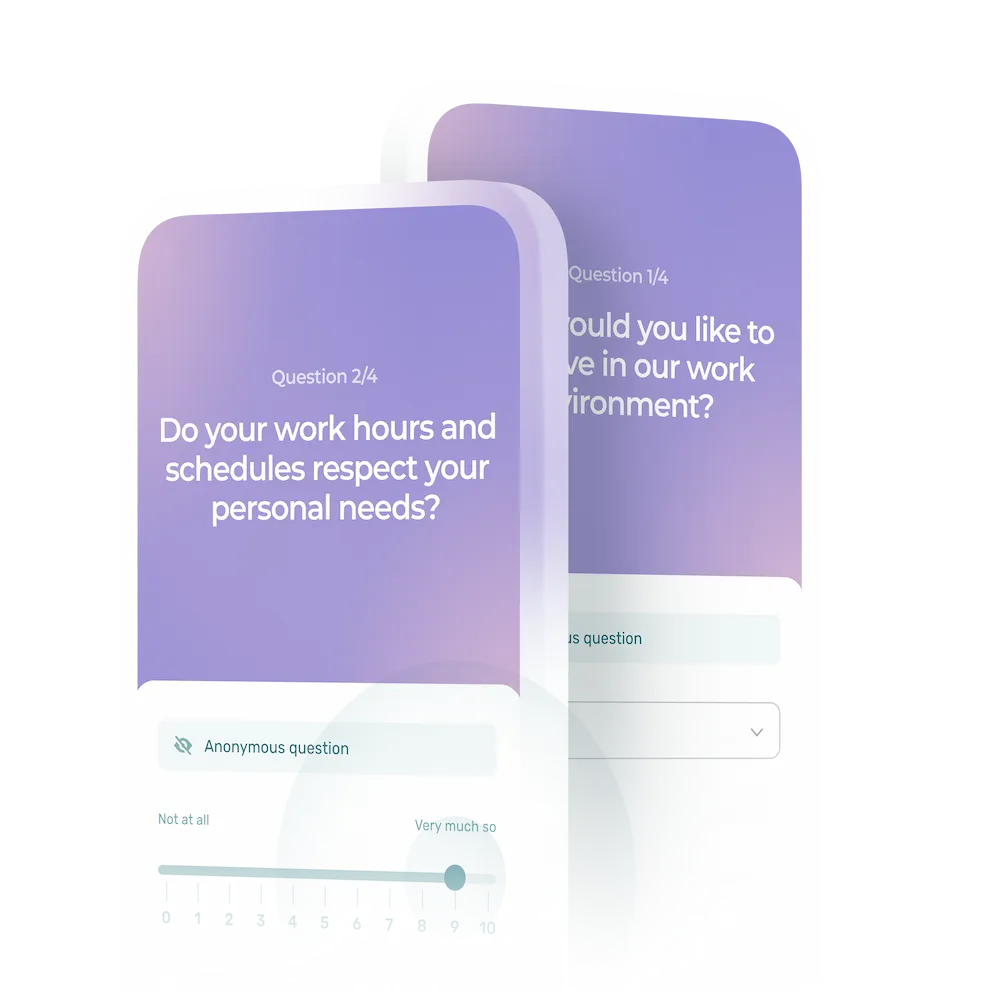Collecting feedback from employees can be difficult for a manager. However, know that this feedback generates multiple benefits for the company, including better employee retention.
While it is common practice to give feedback to employees, the opposite is often overlooked. Yet managers who seek feedback from their employees can improve not only the well-being of their team but also their company’s image.
There is much to be gained by surveying employees about how our management style is affecting their happiness at work—and the various factors that can improve or hinder it. Managers’ actions directly impact the happiness of their teams.
Managers, before taking action, keep in mind that there is no point in collecting feedback if you don’t intend to take action. Furthermore, employees should not feel that their feedback is being requested randomly; all staff should be surveyed on a regular basis.
After all, how can we expect to receive authentic feedback if our own intentions are not?
To receive the best possible feedback, your questions should be clear, explicit and open-ended; they should not prompt basic yes or no answers.
We’ve compiled 56 questions to help you properly survey your team. The answers they will provide will allow you to improve the employee experience at your company. Remember, dedicated and motivated employees are your best ambassadors!
Feedback on the Work Environment
Employees’ work environment has a direct bearing on their health, safety and well-being. It includes all the human and material components that can affect a worker’s daily tasks.
The work environment includes relationships between employees, managers and customers, the layout of the premises, the corporate culture, scheduling and flexibility, and health and safety.
Surveying your employees about their work environment helps you make sure that everything is in order and, if necessary, to take steps to correct any issues.
Questions About the Work Environment
- What improvements could be made to our work environment?
- Do we respect your availability? If not, could you give me an example?
- Do you find that your schedule offers enough flexibility? If not, how could it be improved?
- What do you like most/least about our corporate culture?
- What could be improved in the way we do things [add an example of a task]?
- Can you name a bothersome/unpleasant situation that has occurred in the past few months?
- How does the current work climate positively or negatively impact your daily life?
- On a scale of 1 to 10, how likely would you be to recommend to a friend that they come work for us?
Feedback on Working Conditions
While many believe that working conditions are merely the sum total of an employee’s salary, benefits and vacation, there’s much more to the story. An individual’s role and responsibilities, recognition among peers and superiors, and respect are all important, too.
Asking for feedback on working conditions demonstrates that you care about your employees’ well-being and fulfilment.
Questions About Working Conditions
- What can we do to make your job more enjoyable?
- What information or resources are you lacking to be more effective?
- How would you describe your workload? Too heavy, just right or too light?
- Is your workload reasonable for your role?
- Do you ever feel overloaded with tasks? If so, could you give me an example?
- Do you feel you have enough latitude to make decisions related to your job?
- Are you motivated to do your job?
- If you could change one thing about the relationships on the team, what would it be?
- Do you find that the company provides the necessary support to help you with your career development?
- What career goals have you accomplished in the last six months?
- What would cause you to leave your job with us?
- Would you like to take training to improve your performance in your role? Can you identify any topics you would like to develop?
- Can you name two improvements you’ve noticed since we started collecting feedback?
- What do you like most about working for us?
Feedback on Managers
Managers play a crucial role in team happiness and employee retention. Did you know that according to a Udemy poll of over 500,000 employees, more than 40% of these workers had left a job because of a bad relationship with their manager?
This figure is sky-high! And it’s why you’ll want to get feedback about the managers who supervise your employees.
Questions About the Manager
- Are you satisfied with how often you and your supervisor touch base?
- Does your manager value your opinion enough?
- Do you feel comfortable enough with your manager to raise any work-related issues you might be having?
- Do you feel that your manager is available to listen to your concerns?
- Has your manager shown you appreciation in the past month?
- Do you feel that your manager treats everyone fairly? If not, can you think of an example of a situation that seemed unfair to you?
Feedback on Colleagues
Coworkers and other colleagues can make our lives more enjoyable and often even become friends. However, it cuts both ways: poor working relationships can make your employees miserable and cause them to leave their jobs.
Surveying your employees about their working relationships with their coworkers helps create a healthy work environment. And your team’s mental health is sure to benefit.
Questions about Colleagues
- Do you feel that you have a smooth work relationship with your colleagues? If not, why?
- Do you feel that your colleagues all contribute to a pleasant work environment?
- Have you witnessed or been involved in an argument in the past month? Could you tell me what happened?
- I noticed that a few tasks were forgotten for the close last Thursday. This is not the first time this has occurred when you work with [name of person]. What happened?
- How can I help you improve your work relationships?
- How would you describe the team’s energy level?
Feedback on Onboarding
Welcoming and integrating a new employee into your company is an important step that can have a months-long impact. A successful onboarding process will translate into an engaged, motivated and driven employee.
Not to mention that it will make their training more enjoyable for everyone. Asking questions to get to know your new employees helps make for successful onboarding.
Questions about Onboarding
- Are you lacking anything you need to do your job well?
- How well do you understand your duties?
- On a scale of 1 to 10, how satisfied are you with your experience as a new employee?
- What could we do better to ease your transition into the job?
- Have you received all the necessary training to perform your tasks?
- How have things been with your welcome to the team?
- How satisfied are you with your work environment so far?
- Do you have any questions about your role? Have you had the opportunity to discuss this with your supervisor?
Feedback on Offboarding
An exit interview should always be held when an employee leaves. Offboarding is a key moment for gleaning insights on what led an employee to leave their job.
It can even serve as a catalyst, transforming former employees into ambassadors when they feel that they’ve been respected and treated fairly right up to the end of their employment.
Questions about Offboarding
- How was your relationship with your manager?
- Did you get along with your colleagues?
- What was the factor that made you start looking for another job?
- Have your leave requests and personal constraints always been respected?
- Is there anything that would make you reconsider your decision?
- Were you satisfied with our various benefits, activities and other initiatives?
- How can we improve the employee experience?
- Would you suggest to a friend that they come work with us?
Feedback on Team Activities
Team activities such as holiday parties or team-building activities are vital to keeping employees engaged. In addition to strengthening bonds between team members, they serve as a form of recognition that means a lot to employees.
Surveying employees about past or upcoming activities helps you make sure that everyone is satisfied. It would be a shame to spend significant resources on activities that your team doesn’t like!
Questions About Team Activities
- How satisfied were you with the last team-building activity?
- What did you enjoy most/least about our last team activity?
- For team-building activities, do you prefer sports, professional training, work-related problem solving, etc.?
- How often would you like to do team activities?
- Do you prefer activities in the evening or during the day, on weekdays or weekends?
- Do you have any suggestions for team-building activities that our team would appreciate?
Getting Feedback as a Manager to Drive the Engagement of Your Employees
Valuing your employees’ opinions not only impacts their engagement—feeling that they are contributing to something greater will also boost their performance and happiness.
💡Remember that it’s crucial to survey all your employees authentically and on a regular basis. The data you collect should then be used to improve your practices.
In addition to scheduling, the Agendrix app offers you a survey module to gather feedback from your employees. Curious to try it out? The first 7 days are free!










